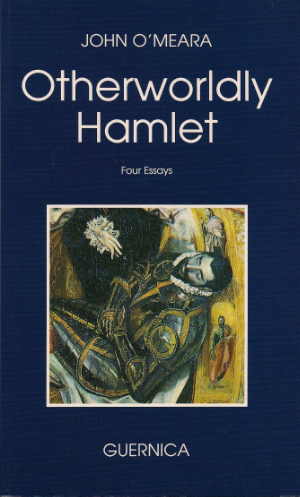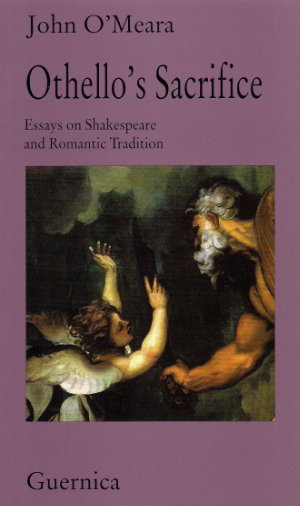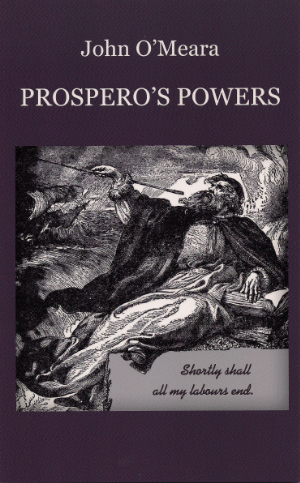A FIRST TRILOGY
1.
reprinted in Remembering Shakespeare: The Scope of his Achievement from ‘Hamlet’ through ‘The Tempest’
Also available at a university library near you. Visit World Cat.
“No other book on Hamlet has yet to consider the way in which the play in its four major aspects of Sorrow, Sexuality, Revenge, and Death, consistently reflects the otherworldly direction of Hamlet's thought and experience …” {Corona Sharp, English Studies in Canada Volume 19, Number 4, December 1993}
“John O’Meara argues that the Lutheran insistence upon the fallenness of man embodied in his sexuality is what animates Hamlet’s self-disgust, and that the search for an Otherworldly guarantee of that perspective is eventually validated at the end of the play.” {David Lindley, Shakespeare Survey, Volume 46, 1994}
“ ... reminds one irresistibly of the Romantic project … something ever more about to be ...” {Ruth Vanita, Hamlet Studies, Volume 16, Summer and Winter 1994, Nos. 1-2}
2.
Othello’s Sacrifice: Essays on Shakespeare and Romantic Tradition (1996)—
reprinted in Remembering Shakespeare: The Scope of his Achievement from ‘Hamlet’ through ‘The Tempest’
Also available at a university library near you. Visit World Cat.
“Very interesting stuff. Particularly where you parallel the break through the tragic dead end to the transcendental-redemptive solution--that I follow from Macbeth through Lear to the last plays--with the Steinerian view of the same progress.” {Ted Hughes, Letter to John O’Meara, 21 November, 1996, in the Ted Hughes Archives, Emory University, Atlanta, Georgia [Facsimiles deposited with the Folger Shakespeare Library]}
“[O’Meara] argues the revelations awarded to the late Shakespeare [with reference to a presentation of] the Anthroposophy advanced by Rudolf Steiner … and it is clear that Steiner’s latter-day Romantic philosophy answers many of the issues Luther raised (and which concerned O’Meara in his book on Hamlet) … O’Meara offers a thesis of evolution in which Shakespeare’s concern with the ego and libido ... is freed by the use of imagination and, in later stages, by inspiration and intuition …” {Arthur F. Kinney, English Language Notes, September, 1998}
“John O’Meara’s analysis of previous critics provides new insight into both the potential and the limitations of Romanticism as an interpretive tool: it [re]opens new vistas of further critical inquiry” {Elizabeth Anne Macdonald-Murray, Canadian Book Review Annual, Vol. 23, July, 1998}
3.
Prospero’s Powers: A Short View of Shakespeare’s Last Phase (2006)
reprinted in Remembering Shakespeare: The Scope of his Achievement from ‘Hamlet’ through ‘The Tempest’
Also available at a university library near you. Visit World Cat.
“In this book John O’Meara answers questions regarding Shakespeare’s late work, which have never been previously satisfactorily addressed. What are Prospero’s studies? Of what nature are the powers he acquires through these? What role did the death of Miranda’s mother play in the development of Prospero, and of The Tempest itself? What exactly is the inner affinity between The Tempest and the central Rosicrucian document, The Chymical Wedding of Christian Rosenkreutz? …
Prospero’s Powers is the culmination and fruit of O’Meara’s previous books on Shakespeare, somewhat as The Tempest itself arose newborn from all Shakespeare’s preceding work … [This book is] a pearl, won from O’Meara’s labours, offering a rare wonder to those fortunate enough to discover it.” {Richard Ramsbotham, author of Who Wrote Bacon? William Shakespeare, Francis Bacon, and James I, 2004}
from DEFENDING HER SON (2000)
Available also at a university library near you. Visit World Cat.
(see “Overview” page above)
I had made the death of the father my theme from Hamlet long before it interwove itself into my own life in the death of my own father, and “death of fathers,” a major theme in Hamlet, I now came to see (with Shakespeare) as the main theme of our evolution out of the past. I continued with his theme in Othello’s Sacrifice where it re-appears as the ultimate failure of the whole tradition of male heroism. It is the mother, I realized, who in her most honoured role now held the key to our evolution into the future, and the death of the mother (a transformation of the death of the beloved) would be the main theme of that further evolution. I had already touched on this theme in Sacrifice, while tracing the progress Shakespeare himself makes in these terms in his last plays. However, I would not be in a position to expound more directly on my new theme until I turned, three years later, to the writing of my next peiece in this line of thought, in the summer of 1997: an essay to which I would give the title “Prospero’s Powers,” in which I focus on the mysterious sacrificial death of Prospero’s wife through whom his own consummate powers come into being. (p.148)


